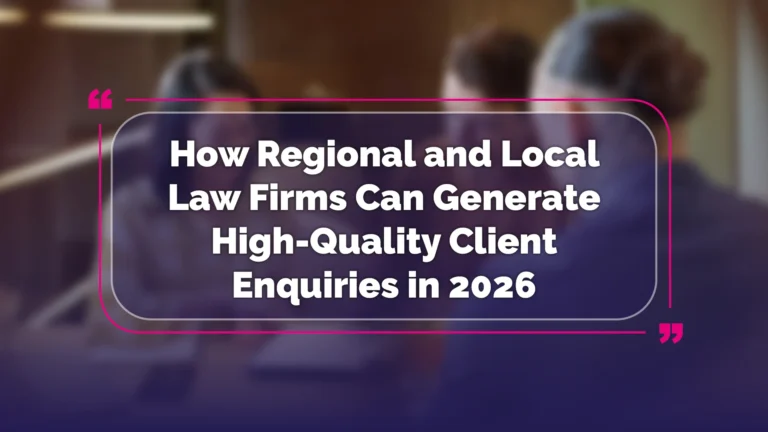Understanding why video marketing is important stands out as a powerful tool for UK law firms looking to engage clients and enhance their online presence. The rise of video content across various platforms has transformed how businesses communicate with their audiences. For law firms, leveraging video marketing strategies can provide a more dynamic and personal touch, making complex legal information more accessible and relatable. Moreover, video content doesn’t have to be produced by professional videographers; anyone in the firm, from solicitors to support staff, can contribute, provided it’s done right.
Key Takeaways
- Essential for Engagement: Video content boosts client engagement and online presence by making legal information accessible and relatable.
- Firm-Wide Contribution: Quality videos can be created by any member of the firm.
- Video Prioritisation: Recent updates favour video content in search results, enhancing visibility.
- Strategic Focus: High-quality, relevant videos maximize visibility and engagement.
- Higher Engagement: Videos outperform written content in engagement and retention.
- Boosts Conversion and Visibility: High-quality videos increase conversion rates and brand visibility.
- Simplifying Legal Concepts: Educational videos explain complex topics, demonstrating expertise.
- Interactive Engagement: FAQ and Q&A videos build trust and credibility.
- Humanising the Firm: Office tours and community involvement videos highlight values and social responsibility.
Google’s Algorithmic Changes
Recent updates to Google’s algorithms place a stronger emphasis on video content. This shift means that video content is more likely to appear in search results, especially for informational queries. Videos are also prioritised in Google’s featured snippets, providing greater visibility. Law firms can leverage this by creating high-quality, relevant videos that meet the needs of their audience.
To maximise the impact, firms should focus on a robust video strategy, which includes creating better video content and adjusting future video strategies based on data and insights.
The Impact of Video Content over Written Content
Video content is significantly more engaging than written content. According to a recent study, viewers retain 95% of a message when they watch it in a video compared to 10% when reading it in text. Creating high-quality videos is crucial as they provide emotional engagement and are more likely to be shared by viewers. This increased engagement can lead to higher conversion rates, with landing pages featuring videos seeing an 80% increase in conversions. Videos can also significantly boost a firm’s brand visibility and organic traffic.
Explainer Videos Explaining Legal Concepts
Educational Videos:
- Simplifying Complex Topics: Create videos that break down complex legal topics into easily digestible segments. For instance, a series on “Understanding Personal Injury Law” can attract clients seeking clear and concise information about their rights and the legal process.
- Example: A short animated explainer video explaining the steps involved in filing a personal injury claim, using colourful characters and fine animation, can demystify the process for potential clients and bring recognition to the brand.
- Advanced Topics: For more specialised areas of law, such as intellectual property or corporate law, produce explainer videos that address specific issues, such as “How to Protect Your Intellectual Property” or “Navigating Corporate Mergers.” Explainer videos focus on helping the audience better understand the need for a product or service, often by depicting a fictional journey of the company’s core buyer persona overcoming a problem with the business’s solution.
FAQs:
- Addressing Common Questions: Develop a series of videos answering frequently asked questions. This not only helps potential clients but also establishes the firm as an authoritative source of information.
- Example: A video addressing common questions about divorce proceedings, such as “What are the grounds for divorce in the UK?” or “How is child custody determined?” can provide valuable insights and reassurance to viewers.
- Interactive Q&A Sessions: Host live video Q&A sessions on social media platforms where solicitors can answer questions in real-time. This interactive approach builds trust and offers immediate value to viewers.
Showcasing Firm Culture
Behind-the-Scenes:
- Office Tours: Give viewers a behind-the-scenes look at the law firm, including office tours and team introductions. This helps humanise the firm and makes it more approachable.
- Community Involvement: Highlight the firm’s community involvement and charity work to showcase its commitment to social responsibility.
- Example: A video tour of the office featuring interviews with staff members can provide a glimpse into the firm’s working environment and culture, making potential clients feel more connected. Creating brand videos as part of advertising campaigns can also build awareness and attract the target audience by showcasing the firm’s vision, mission, and services.
Solicitor Profiles:
- Personal Touch: Produce short videos profiling individual solicitors. Discuss their areas of expertise, professional background, and personal interests to build a connection with potential clients.
- Example: A video featuring a solicitor specialising in family law, discussing their approach to cases and why they chose this field, can resonate with clients seeking compassionate and knowledgeable representation.
Equipment and Production Tips for the Video Creation Process
Modern mobile phones are essentially handheld studios, capable of producing high-quality video content. Here are some tips for creating professional-looking videos:
The video creation process involves defining goals and maintaining a human touch throughout to create impactful marketing videos.
- Lighting: Ensure good lighting to avoid shadows and make the video look more professional. Natural light is often the best option.
- Sound: Use an external microphone if possible to ensure clear audio. Poor sound quality can detract from the message.
- Stability: Use a tripod or stabiliser to avoid shaky footage.
- Editing: Simple video editing software can enhance the final product. Add captions, transitions, and music to make the video more engaging. The post production process is crucial to creating polished, professional videos.
Utilising Social Media
Platform-Specific Content:
- Tailored Content: Tailor video content for different social media platforms. Use short, engaging clips for Instagram and TikTok, while sharing longer, informative videos on YouTube and LinkedIn.
- Unique Features: Leverage the unique features of each platform, such as Instagram Stories and LinkedIn articles, to reach a broader audience.
Engagement and Interaction:
- Encourage Interaction: Encourage viewers to interact with the content by asking questions, leaving comments, and sharing the videos. Respond to comments and engage with viewers to build a community around the firm’s brand.
Enhancing SEO with Video
Optimised Content:
- Search Engine Visibility: Ensure video content is optimised for search engines. Use relevant keywords in video titles, descriptions, and tags to improve visibility.
- Video Footage Management: Organise and back up video footage to streamline video editing and optimisation processes, enhancing the quality and engagement of your videos.
- Accessibility: Include transcripts and captions to make videos accessible and enhance SEO.
Embedding Videos:
- Website Integration: Embed videos on the firm’s website and blog to increase engagement and time spent on site. This can positively impact the site’s search engine ranking.
YouTube Channel:
- Organised Content: Create a dedicated YouTube channel for the firm, organising videos into playlists based on topics. Regularly update the channel with new content to keep it active and engaging.
Measuring Success
Analytics:
- Performance Tracking: Use video analytics tools to track performance metrics such as views, engagement, and conversion rates. This data can provide insights into what types of content resonate most with the audience. Incorporate customer testimonial videos to showcase real-life success stories and build trust.
- Continuous Improvement: Adjust video strategies based on the analytics to continuously improve content effectiveness. Measure the performance and statistics of video marketing campaigns by analysing metrics related to video viewers.
Client Feedback:
- Direct Feedback: Collect feedback from clients regarding the video content. Understanding what clients find helpful or interesting can guide future video production efforts.
Conclusion
Video marketing offers UK law firms a dynamic way to engage clients, explain complex legal concepts, and build a strong online presence. With the rise of smartphone technology, the increased ease and convenience of watching videos online have made video content more accessible and engaging for audiences. By creating educational content, showcasing firm culture, utilising social media, enhancing SEO, and measuring success, law firms can effectively leverage video marketing to attract and retain clients. Embracing this visual medium can set a law firm apart in a competitive market, establishing it as a trusted and authoritative source for legal information.
Reach out to our team to discover how we can help transform your digital marketing for law firms.




